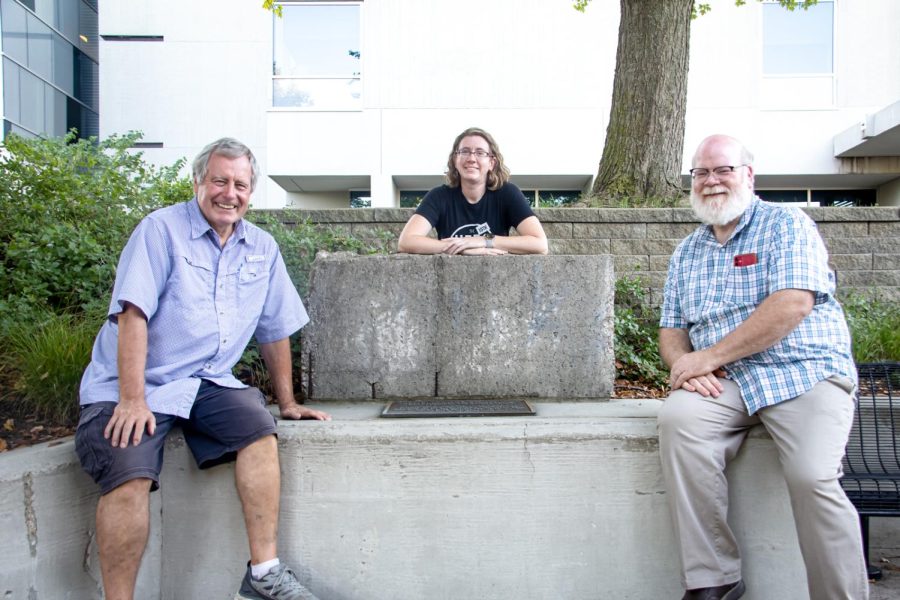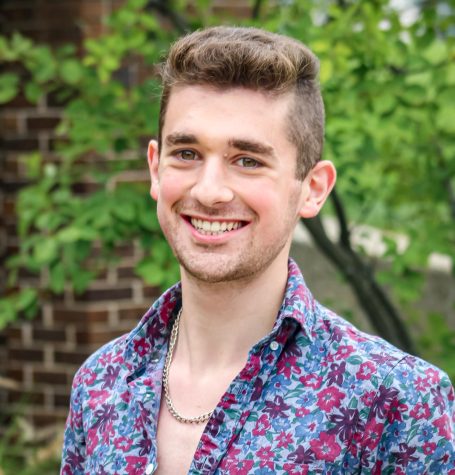GV professor commemorates 30-year anniversary of Berlin Wall fragment’s installation at Zumberge
Sep 6, 2022
For Grand Valley State University, Sept. 1 marks the anniversary of a unique connection between its Allendale campus and a pivotal historical event that shaped the future of the United States and the global community at large: the fall of the Berlin Wall.
Leading students across the Little Mackinac Bridge and onto the campus’s Great Lakes Plaza on Sept. 1, GVSU Senior Affiliate Professor of German, Mitchell Place, took groups on excursions throughout the day to present against the backdrop of GVSU’s portion of the Berlin Wall. The piece of the wall is located outside Zumberge Hall and was installed exactly 30 years prior.
Detailing the history of the Wall and its dismantling as he distributed photos of his past travels to those watching the presentation, the professor sought to immerse his pupils in the significance of the piece.
Place said his motivation behind the annual excursions is rooted in a desire to keep history alive.
“Mainly, the reason I do it is because I just want students to be aware,” Place said. “I don’t know whether these facts of history are always taught continually. I don’t know how much these students know about the Berlin Wall and it’s a passion of mine to have them know about that because it was something that really shaped my identity as an undergraduate.”
While Place typically conducts such excursions in November of each year to commemorate the fall of the Berlin Wall, Sept. 1 of this year marked the 30-year anniversary of GVSU’s installation of its fragment of the historic barrier.
Having the opportunity to instill his students with a personal immersion in history, Place said, compels him to keep up the yearly outings.
“I want to try to convey that sense to my students, and I want them to know what it all means,” Place said. “I want them to keep that understanding going so people don’t forget over time.”
Alongside Place, a member of the Edelweiss Club of Grand Rapids, an organization dedicated to the celebration of German culture in the local community, offered students firsthand perspectives on the state of Germany both before and after the fall of the Berlin Wall.
The representative’s upbringing in Southern Germany beneath the specter of the Wall and Soviet oppression was evident as they wished to remain anonymous in the Lanthorn’s reporting.
“If you had asked me, would I, in my lifetime, see German reunification, I would’ve told you, ‘Not in my lifetime, but eventually,’” the representative said. “You can’t keep the human spirit down.”
The fall of the Berlin Wall, the representative said, served as a microcosm of the larger truth that oppression would never stand against the free will of the people who oppose it.
“You can do it for one, but you cannot do it forever because people want to be free,” the representative said. “They want to have a good life and they just want to be in control of their own lives.”
Hope, Place said, compounds other feelings of optimism each time he comes to see a piece of the Wall.
“I just remember being awestruck,” Place said. “After the awestruck kind of wore off, then I thought it was kind of a joyful time.”
Place’s remembrance activity came two days after the death of former Soviet President Mikhail Gorbachev who occupied the office during the destruction of the wall in late 1990 and the fall of the Soviet Union in 1991.
Having publicly hinted at his desire to restore the former Russian empire, current Russian President Vladimir Putin has indicated that he will deny Gorbachev a state funeral and will avoid memorial activities.
However, Place said he hopes that leaders of today can learn from the actions of those like Gorbachev who worked to dismantle barriers and bring the global community closer together.
“I would hope that leaders would understand that they can try to oppress peoples, but they’re not going to be successful basically forever,” Place said.























